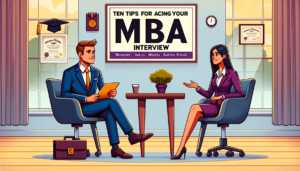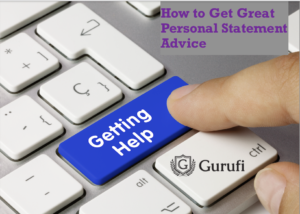
At Gurufi, we focus on helping clients brainstorm, build, write, and revise powerful personal statements that move the needle on their admissions. But just because we don’t charge for the other stuff doesn’t mean we don’t give it away for free! 🙂 With that in mind, here are ten tips for nailing your MBA interview!
If there’s one part of the MBA admissions process that rattles many applicants, it’s the interview. At many schools, earning an interview is an achievement in itself, and you don’t want to fumble this important opportunity. It’s a precious opportunity to elevate above your written application and showcase your personality, aspirations, and fit for the program. The committee can see you as a fully formed person and ask you about your aspirations. Excelling in this interview requires more than just thorough preparation; it demands an understanding of nuanced interpersonal skills, research acumen, and an ability to engage genuinely and thoughtfully.
Mastering Interpersonal Skills and Politeness
The foundation of a successful MBA interview lies in getting the basic interpersonal dynamics right. Politeness and courtesy are not just niceties; they are critical indicators of your ability to navigate future professional interactions. This includes simple gestures like greeting the interviewer with a warm, confident smile, maintaining appropriate eye contact, and showing gratitude for the opportunity. These seemingly minor details can set a positive tone for the entire conversation.
If you do an in-person interview, be polite and kind to secretaries. They have remarkable sway in office settings, and a bad word from them because you couldn’t deign to be nice to someone you saw as maybe beneath you can (rightly) sink your application.
Also, afterward, be sure to send a short thank-you email to your interviewers. It shouldn’t be more than 100ish words long. I actually prefer sending a short hand-written note instead, but other people find that old-fashioned.
Research: Your Secret Weapon
One cannot overstate the importance of doing your homework on the school and the interviewer. Understanding the school’s ethos, culture, and values helps tailor your responses to align with what they are looking for in a candidate. If possible, research your interviewer’s background. This knowledge can provide valuable context during the conversation, allowing for a more personalized and engaging interaction.
Preparing Questions: Show Your Engagement
Coming prepared with thoughtful questions is a strategy often overlooked by candidates. These questions should not be generic but tailored to the specific program and its offerings. Inquiring about aspects like faculty, course structure, or specific initiatives demonstrates your genuine interest and investment in the school. It also provides an opportunity to further assess whether the program aligns with your career objectives.
Responsive and Genuine Answers
While it’s crucial to prepare for common interview questions, equally important is the ability to be responsive and genuine in your answers. Listen attentively to the questions asked and provide direct, succinct responses. This reflects your ability to process information and communicate effectively — key skills in any business setting.
Avoiding the Humble-Brag Pitfall
A common misstep in interviews is the tendency to ‘humble-brag’. It’s essential to showcase your achievements and strengths, but this should be done with humility and authenticity. Overstating accomplishments or framing them in a boastful manner can leave a negative impression. Instead, focus on sharing experiences and learnings that genuinely reflect your growth and potential.
The Virtual Interview Environment
In today’s digital age, many interviews are conducted virtually via platforms like Zoom or Skype. It’s crucial to ensure your background is clean, professional, and free of distractions. An interesting, yet appropriate background can also serve as a conversation starter. Test your equipment beforehand to avoid technical glitches and ensure good lighting and sound quality.
Practice Makes Perfect
Extensive practice is the key to confidence. Engage in mock interviews, record yourself to analyze body language and speech patterns, and seek feedback from mentors or peers. Practicing under simulated conditions can help alleviate anxiety and improve your overall performance.
You Can Do It!!!
Nailing your MBA interview is an art that balances preparation with spontaneity, professionalism with personality. It’s about demonstrating your capability and fit for the program while also assessing the school’s alignment with your goals. Remember, the interview is not just an evaluation of you — it’s a two-way street. Approach it with the right mindset, and you’ll not only impress your interviewers but also gain valuable insights into your own aspirations and potential as a future business leader.
For help with your MBA personal statement, check us out at Gurufi.com. Our personal statement editors and consultants have decades of experience helping clients get into top Masters and Ph.D. programs in STEM, humanities, fine arts, and social sciences. Our specialty is helping you craft compelling personal statements that move the needle in your admissions process! For questions, shoot us an email at service@gurufi.com. Check us out on Facebook, Twitter, and LinkedIn.








